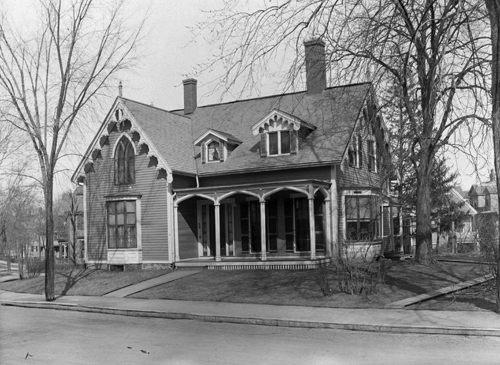Streets of Brookline
| ⇐ Prev | - Zoom - | Next⇒ |
 | ||
| 9 Toxteth St. | ||
|
This house, which is still standing, was built as part of the 1843-1844 development of the Linden St. area and was a stop on the Underground Railroad. It was the “cottage” of William Ingersoll and Sarah Bowditch until 1867 when they moved to a larger house at 225 Tappan St.
In June, 1849, the Bowditches held a picnic for a group of black children, most of them associated with the Abiel Smith School on Beacon Hill (the building is in use today as Boston's Museum of African American History). The children were carried to Brookline and then back to Boston on the recently completed Brookline Village line of the railroad. The picnic, as described in the abolitionist newspaper The Liberator, was "an occasion of unalloyed satisfaction… The merry group employed their time to the best advantage, in swinging, dancing, nimbly pursuing each other, singing the songs of freedom, gathering flowers, and especially in disposing of the refreshments which were so bountifully provided for them." Henry "Box" Brown, who had escaped from slavery a few months earlier by having himself mailed in a box, was there and spoke to the children. Other attendees included anti-slavery activists from Brookline and Boston, as well as the ministers of the local Unitarian and Baptist churches. From the report of the Massachusetts Historical Commission: “Before the Civil War, he was a firm believer in abolition, becoming active in both Brookline and Boston efforts. He belonged to the Boston Vigilance Committee. Bowditch, along with Edward Atkinson and Edward Philbrick, participated actively in the fight against slavery. Besides trying to sway public opinion through meetings and lectures, Bowditch used his house for sheltering fugitive slaves. In 1849-1850, a South Carolina couple arrived in Boston on their way to freedom. They spoke at the Brookline Town Hall and stayed at #9 Toxteth. From there they went to other residences in town. At another time, Bowditch drove a slave from the brig Cameo from Boston to Concord and returned home in time for breakfast. Perhaps the most illustrious guest during this period was John Brown's son. The young man was hidden here after his father's execution for his involvement in the Harper's Ferry raid.“ Image Courtesy the Brookline Preservation Department | ||